|
|
|
Sort Order |
|
|
|
Items / Page
|
|
|
|
|
|
|
| Srl | Item |
| 1 |
ID:
111595
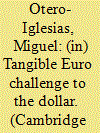

|
|
|
|
|
| Publication |
2012.
|
| Summary/Abstract |
The main purpose of this article is to shift the dollar vs Euro debate away from US-EU centrism to perspectives from emerging markets. Drawing on 40 semistructured financial elite interviews in Brazil and China, the key research question studied here is whether the US dollar is malfunctioning as the leading international currency in these parts of the world, and, if so, whether the Euro can be an alternative to the greenback. The results show that the status of the dollar as the main anchor in the monetary system is seriously questioned among financial elites in China and Brazil. As yet, though, the Euro does not represent an alternative to the dollar because of its fiscal and political fragmentations. However, despite these institutional shortcomings, the European currency is seen as an ideational role model for super-sovereign monetary integration out of dollar unipolarity based on consensual negotiations not only on a regional, but also on a global scale.
|
|
|
|
|
|
|
|
|
|
|
|
|
|
|
|
| 2 |
ID:
153895


|
|
|
|
|
| Summary/Abstract |
The Brazilian-Argentine Agency for Accounting and Control of Nuclear Materials (ABACC) is a unique bilateral nonproliferation regime created by Brazil and Argentina after a long process of negotiations and confidence building. The creation of the agency in July 1991 marked a paradigmatic shift in the Brazilian-Argentine relationship, converting their long rivalry into a profound strategic partnership. This article presents a historical overview of the creation of ABACC and discusses how it paved the way for the integration of Brazil and Argentina into the nonproliferation regime. The article also shows how ABACC tackled nonproliferation challenges in the twenty-first century, helping Brazil and Argentina continue their nuclear programs with fewer risks to the autonomy and development goals traditionally defended in their foreign policies.
|
|
|
|
|
|
|
|
|
|
|
|
|
|
|
|
| 3 |
ID:
084002


|
|
|
|
|
| Publication |
2008.
|
| Summary/Abstract |
This article reports on the results of a workshop on active teaching and learning sponsored by the Instituto de Relações Internacionais at the University of Brasilia. This 2-day, intensive workshop was designed by the authors to introduce teaching and learning strategies and to promote critical dialogue for professors and advanced students from institutions across Brazil. Details are provided on sessions that addressed the philosophy behind active teaching and learning, resources available for developing and carrying out exercises, a wide range of techniques, and the importance of debriefing and assessment. Finally, the article provides an evaluation of the workshop experience, emphasizing its potential value for training international relations instructors, both within the United States and across other international contexts, on ways to integrate active teaching and learning into their classrooms.
|
|
|
|
|
|
|
|
|
|
|
|
|
|
|
|
| 4 |
ID:
120541
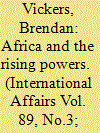

|
|
|
|
|
| Publication |
2013.
|
| Summary/Abstract |
With abundant resources and growing markets, the African continent is once again at the centre of a new 'great game of courtship' between the established and rising powers. However, compared with previous decades, African countries are no longer passive players in international relations.
This article explores Africa's recent negotiating behaviour in relation to a selected set of actors that animate the current shifting global economic order: rising powers, established powers and international organizations. Despite potential sources of bargaining leverage, most African countries (with some notable exceptions) are still reactive to the bilateral overtures of Brazil, China and India and unable to set the terms of engagement.
Nonetheless, the rise of these new powers provides alternative negotiating partners (and potentially more developmental outcomes) to the established powers. By comparison, at the multilateral level the African Group has been far more active and assertive in contesting global governance in the pursuit of greater distributive justice, particularly in the climate, trade and security regimes. This has taken place largely through the adroit use of distributive bargaining and tactics, supplemented by normative-based strategies highlighting Africa's underdevelopment.
The central argument of the article is that African countries require judicious negotiating strategies, improved deliberative capacities and coalitions with local/continental/global civil society and business networks in order to ameliorate their weaker bargaining power and reshape the terms of their engagement with their international partners, particularly the rising powers.
|
|
|
|
|
|
|
|
|
|
|
|
|
|
|
|
| 5 |
ID:
174087
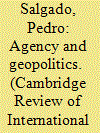

|
|
|
|
|
| Summary/Abstract |
The main narratives that explain the development of the modern international order fall short of incorporating the historical peculiarities of processes of state-formation in non-European contexts. To overcome that limitation, this paper argues that class agency must be taken as a core element to understand the social and geopolitical struggles that shape each case of transition towards modern sovereignty in its historical particularity. This is informed by the Brazilian historical experience. In that case, statehood can only be understood as an outcome of the disputes of its ruling landowning class against Portuguese colonialism, mediated by the British informal empire throughout the 19th century. In order to bring all these elements together, I follow the tradition of political Marxism to reconceptualize the very notion of “geopolitics” by grounding it in class-based strategies of reproduction and spatialization. The result is an agency-centred and radically historicist theoretical framework that rejects structuralist transhistorical logics of development. It also argues against the latent Eurocentrism present in theories of state-formation that are grounded on the European experience and simply transposed to other contexts by stressing the agency of non-European subjects in the making of their own history.
|
|
|
|
|
|
|
|
|
|
|
|
|
|
|
|
| 6 |
ID:
151797


|
|
|
| 7 |
ID:
160990


|
|
|
|
|
| Summary/Abstract |
With the continued use of unsafeguarded naval nuclear-propulsion programs in all nuclear-weapon states, the commissioning of an Indian nuclear submarine, and the potential investment in such programs by non-nuclear-weapon states including Brazil and South Korea, movement toward a regulatory regime for nuclear material in the naval sector has become imperative. Such a framework faces a recurring debate on adequately protecting sensitive military technology while delivering assurances that naval nuclear material is not diverted to nuclear-weapon programs. In this viewpoint, we examine various prospective mechanisms to regulate naval nuclear stocks and assess them in terms of their effectiveness and scope. Drawing on lessons from the drafting, negotiation, and implementation of the Model Additional Protocol, we recommend a safeguards regime for naval nuclear material via a protocol that supplements the existing global nuclear-governance system. This protocol provides a standardized yet flexible approach to naval nuclear-material safeguards across all states (whether nuclear-weapon states, non-nuclear-weapon states, or outside the Treaty on the Non-Proliferation of Nuclear Weapons) to handle variations among naval nuclear fuel cycles and technologies.
|
|
|
|
|
|
|
|
|
|
|
|
|
|
|
|
| 8 |
ID:
104713
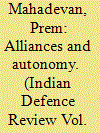

|
|
|
| 9 |
ID:
101608
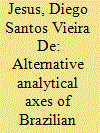

|
|
|
|
|
| Publication |
2010.
|
| Summary/Abstract |
This article identifies the limitations of classical, sociopolitical, and interactive analytical axes for explaining the crisis of paradigms and the content of Brazilian foreign policy and to propose alternative perspectives to overcome these limitations. A constructivist axis is used to examine the co-constitution of agent and structure and to identify the possibilities of change. A poststructuralist axis is used to show that Brazilian "Foreign Policy" reproduces practices of differentiation and is connected to the containment of challenges to identity. A postcolonial axis is used to show that Brazilian foreign policy can provide answers to the challenges of interaction with diversity through self-reflection and culturally diverse criticism to inequality.
|
|
|
|
|
|
|
|
|
|
|
|
|
|
|
|
| 10 |
ID:
096477
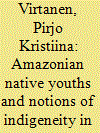

|
|
|
|
|
| Publication |
2010.
|
| Summary/Abstract |
The indigenous presence in urban areas of Amazonia has become more visible as Indian populations have negotiated their own spaces and acted in new contexts previously reserved for the dominant society. This article looks at ways in which today's young Indians in an urban area define and interpret their new cultural and social situations, drawing from research conducted with Apurin , Cashinahua and Manchineri youths in Rio Branco, a city in Acre state, Western Brazil. These young people occupy a variety of "native" and "non-native" habituses and develop their notions of indigeneity within complex social networks as part of their strategy for rupturing the otherness associated with indigeneity. The text contributes to the discussion on the theory of practice and identity politics, as well as embodiment. Young Indians in urban Amazonia constitute their agencies in multiple ways and use various embodiments based in the practices and knowledge of their native groups and those of urban national and global society. The young natives break with the image of Lowland South American Indians as peoples uncontaminated by urban influences and help promote new interactions between native populations in the reserve and the city.
|
|
|
|
|
|
|
|
|
|
|
|
|
|
|
|
| 11 |
ID:
122832
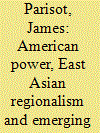

|
|
|
|
|
| Publication |
2013.
|
| Summary/Abstract |
Recent years have seen a revival of discussions on American decline. This paper intervenes in this debate by suggesting that there is a tendency towards partial conceptualisations of US power. It suggests a new historical materialist perspective that makes it possible to theorise American Empire as a relational social totality embedded within global capitalism. The paper then analyses the social limits of China's rise and the integration of East Asian regionalisation into American Empire, suggesting the extent to which world power has shifted east has tended to be overestimated. It also analyses the emergence of Brazil, India, and the brics meetings, suggesting these developments have a limited, but overstated, capacity to challenge American Empire.
|
|
|
|
|
|
|
|
|
|
|
|
|
|
|
|
| 12 |
ID:
058756
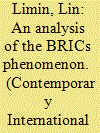

|
|
|
| 13 |
ID:
151298
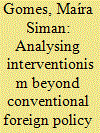

|
|
|
|
|
| Summary/Abstract |
Most of the analysis dealing with so-called “emerging powers” in the field of peace and security seek to explain the intentions and motivations (supposedly) behind these states’ foreign policy and changing normative positions. Several of those studies see foreign policy decisions as the result of rational processes, defined by a “means-and-ends” logic, essentially oriented by preconceived national interests, clear ideational precepts and fixed identities. Through a non-conventional analysis of the participation of Brazil in the United Nations Stabilization Mission in Haiti (MINUSTAH), the paper aims to advance an understanding of foreign policy as an identity practice that, especially in moments of domestic identity crisis, helps reinforce and stabilize specific representations of the state self and of those acting in its name. Informed by a post-positivist approach, the case discussed in the paper opens some avenues to explore how interventionism can be analysed beyond traditional foreign policy rationales and mainstream international relations theories.
|
|
|
|
|
|
|
|
|
|
|
|
|
|
|
|
| 14 |
ID:
110370


|
|
|
|
|
| Publication |
2011.
|
| Summary/Abstract |
We present evidence for the coexistence of two antagonistic sugarcane ethanol production technologies in Brazil, with the Southeast region of the country having relatively mechanized production processes, and the Northeast area using labor-intensive ones. We highlight the main differences between the hand-production and fully automated mechanical manufacturing in the Brazilian ethanol industry and examine the historical, political, and economic factors that induced this regional technology gap that is currently observed. We then construct an environmental model based on a 375-industry interregional input-output system for the Brazilian regions, in order to determine the extent to which the primitive ethanol production of Northern Brazil differs from the automated manufacture technologies of the South in terms of greenhouse gas emissions. We show that ethanol produced with modern technologies generates lower carbon dioxide (CO2) emissions than ethanol produced with traditional production processes. We also demonstrate that ethanol, regardless of the technology with which it was produced, is more carbon-efficient than petrochemical products.
|
|
|
|
|
|
|
|
|
|
|
|
|
|
|
|
| 15 |
ID:
153860


|
|
|
|
|
| Summary/Abstract |
This article illustrates how Brazil responded to the policy challenges its foreign policy activism posed for its engagement with a fundamental question of the international order: the tension between the protection of human rights and the prohibitions on intervention and the use of force. Leading the military component of the UN Stabilization Mission in Haiti (MINUSTAH) implicated accepting the mission's robust mandate that contradicted Brazil's traditional foreign policy positions. Notwithstanding this apparent contradiction, the country's diplomats also tried to shape UN debates on intervention norms, resulting inter alia in the ‘responsibility while protecting’ initiative. By analysing diplomatic efforts and military actions on the ground, we argue that since the watershed moment of becoming the most influential troop contributor to MINUSTAH, interests and actions of the armed forces increasingly contradict the efforts of Brazil's diplomatic establishment. The influence of Brazil's diplomacy in shaping intervention norms has proved to be rather elusive, compared with its military's palpable role in developing robust approaches for peacekeeping mandates revolving around the protection of civilians. Yet we argue that this apparent contradiction should not be seen as inconsistency. Instead, the case of Brazil shows typical signs of the ‘graduation dilemma’, in which both diplomats and military behaved in an eminently rational fashion.
|
|
|
|
|
|
|
|
|
|
|
|
|
|
|
|
| 16 |
ID:
107103


|
|
|
|
|
| Publication |
2011.
|
| Summary/Abstract |
THE DECEMBER 2010 ISSUE of Negocies Estrangeiros, official biannual of the Portugal Diplomatic Institute at the Foreign Ministry of Portugal, carried a detailed analytical forecast by Joao Fabio Bertonha, professor of history at the State University of Maring (Brazil). The journal deals mainly with topical issues of Portugal's foreign policy, foreign economic activities and historical and cultural contacts with the rest of the world. It appears in Portuguese with some of the materials published in English.
Issue 18 deals with a selection of articles on various subjects and in different genres contributed by Portuguese and foreign authors; information materials coexist here with fundamental analytical studies, a veritable feast for inquisitive minds.
|
|
|
|
|
|
|
|
|
|
|
|
|
|
|
|
| 17 |
ID:
165050
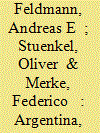

|
|
|
|
|
| Summary/Abstract |
This article examines the role of Argentina, Brazil and Chile (the ‘ABC countries’) in supporting democracy through the logic of consequences and appropriateness in three emblematic cases: the removal of President Zelaya in Honduras in 2009, the constitutional crisis that led to the removal of President Fernando Lugo in Paraguay 2012 and the sudden closing of the National Assembly in Venezuela in 2017. The authors argue that the ABC governments’ responses to governance crises have been shaped by a mixture of motivations, both instrumental (geopolitical interest or ideological affinity) and ideational (a normative preference for democracy). This mixture has resulted in inconsistent policies deriving from the mismatch between the normative commitments made by these countries, enshrined in multilateral instruments such as democracy clauses, which have often limited their room for manoeuvre, and their preference for a measured, prudent foreign policy based upon traditional principles of non-intervention. Specifically, the authors find that the ABC countries’ stance on democracy support depends on two fundamental conditions: their leverage vis-à-vis the target state and the degree of certainty regarding a potential resolution of a given democratic crisis.
|
|
|
|
|
|
|
|
|
|
|
|
|
|
|
|
| 18 |
ID:
197171


|
|
|
|
|
| Summary/Abstract |
The decisive victory of Javier Milei in Argentina’s 2023 presidential elections signalled major changes in domestic policies and potential shifts in the country’s foreign policy and global positioning. During his campaign, Milei advocated a Western-oriented alignment with the United States, Israel and the ‘free world’, vowing to sever ties with ‘communist’ countries, including Brazil and China – Argentina’s major trading and economic partners. But his capacity to do this will likely be constrained by pressure to maintain domestic stability and his own ultra-libertarian principles. While Argentina probably will increasingly look West under Milei, the extent to which ties with the Global South, including Brazil and China, can be curtailed remains uncertain. The need for economic continuity and stability may temper Milei’s ability and inclination to break or significantly downgrade important relationships, pointing to substantial continuity in foreign and trade policy.
|
|
|
|
|
|
|
|
|
|
|
|
|
|
|
|
| 19 |
ID:
053198
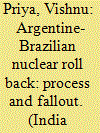

|
|
|
|
|
| Publication |
Jan-Jun 2004.
|
|
|
|
|
|
|
|
|
|
|
|
|
|
|
|
| 20 |
ID:
125408


|
|
|
|
|
| Publication |
2013.
|
| Summary/Abstract |
This study assesses the impacts of promoting, through auctions, centralized solar power generation (concentrated solar power - CSP, and photovoltaic solar panels - PV) on the Brazilian power system. Four types of CSP plants with parabolic troughs were simulated at two sites, Bom Jesus da Lapa and Campo Grande, and PV plants were simulated at two other sites, Recife and Rio de Janeiro. The main parameters obtained for each plant were expanded to other suitable sites in the country (totaling 17.2 GW in 2040), as inputs in an optimization model for evaluating the impacts of the introduction of centralized solar power on the expansion of the electricity grid up to 2040. This scenario would be about USD$ 185 billion more expensive than a business as usual scenario, where expansion solely relies on least-cost options. Hence, for the country to incentivize the expansion of centralized solar power, specific auctions for solar energy should be adopted, as well as complementary policies to promote investments in R&D and the use of hybrid systems based on solar and fuels in CSP plants.
|
|
|
|
|
|
|
|
|
|
|
|
|
|
|
|
|
|
|
|
|